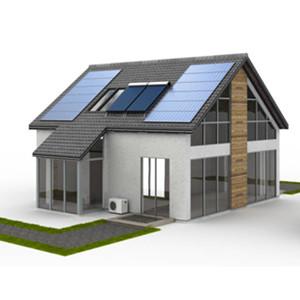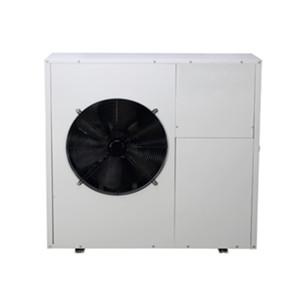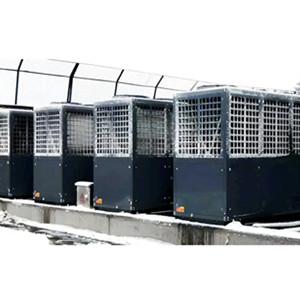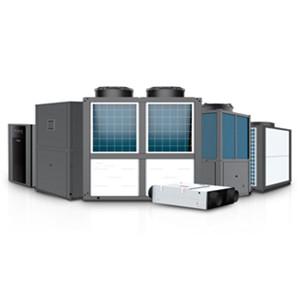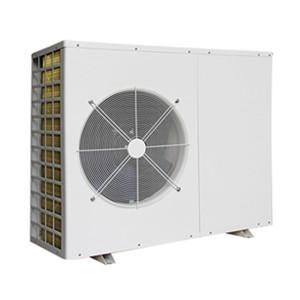Air Source Heat Pump Definition
What is an air source heat pump?
Even when it's cold outside, a heat pump can extract thermal energy from
the air or ground and use it to warm your home.
A well-designed heat pump system transfers approximately three to four
times as much energy as heat into a property, which is then used to extract the
heat. As a result, heat pumps are very efficient and have the potential to
significantly reduce fuel bills, especially in properties where mains gas is
not available.
1. Ideal for off-grid properties
2. Use energy stored in the air or underground to provide heating and
hot water
3. More energy is produced than used
4. Eligible for Renewable Heat Incentive (RHI) payments to offset
MCS-compliant installation costs
How does an air source heat pump work?
An air source heat pump works much like a refrigerator running in
reverse to heat your home. Here's how it works:
1. Outside air is blown through a network of pipes filled with
refrigerant. This causes the refrigerant to heat up and change from liquid to
gas.
2. This gas goes through a compressor, which increases the pressure.
Compression also adds more heat - similar to how an air hose heats up when you
inflate a tire.
3. The compressed hot gas enters the heat exchanger surrounded by cold
air or water. The refrigerant transfers its heat to this cold air or water,
making it warmer. This circulates in your home to provide heating and hot
water. At the same time, the refrigerant condenses back to the cold liquid and
starts the cycle again!

Using an Air Source Heat Pump at Home
Air source heat pumps can be used to heat your home and water. Here are
some things to consider.
1. Use an air source heat pump for heating
Heat pumps work best when the difference between indoor and outdoor
temperatures is small. Just like your refrigerator has to work harder on a hot
day.
This makes them ideal for underfloor heating systems. Floors cover a
much larger area than radiators, so they don't need to get as hot to provide
the same amount of heat.
The output of an air source heat pump is also lower than that of a gas
or oil boiler. This means they can't transfer heat quickly. Instead, they are
best used to slowly heat your home over an extended period of time.
2. Air source heat pumps and radiators
If you have radiators in your home and you are switching from a gas
heating system to an air source heat pump, you may want to buy some larger
radiators to keep your house warm.
3. Use an air source heat pump to provide hot water
A heat pump can also be a good source of hot water - but the water will
be cooler than a boiler. In practice, this means that if you're taking a
shower, you'll need more hot water than water from a cold tap. Therefore, you
may also need a larger hot water tank for your needs.
Advantages and disadvantages of air source heat pump
Advantages of air source heat pump
1. Efficient heat source and hot water
2. Zero carbon if used with renewable tariffs
3. Can closely match the running costs of other home heating systems
4. Installation costs are offset by renewable heat incentive payments
5. Low maintenance cost and long service life
6. Some systems can provide cooling in summer
Disadvantages of Air Source Heat Pumps
1. Lower output temperature compared to traditional boilers - you may
need to update insulation and invest in larger radiators
2. May work best in older homes as part of a hybrid system with a
traditional boiler
3. Requires outdoor space and can be noisy
4. The installation cost is high, and the effect is best when used with
the water tank
5. Not working efficiently in extremely cold weather
Types of Air Source Heat Pumps
There are two main types of air source heat pumps, "air to
air" and "air to water". Most air source heat pump units in the
UK are of the so called "air to water" type.
1. "Air to Water" Air Source Heat Pump
Most air source heat pump units are of the so-called "air to
water" type. In these systems, heat is transferred to conventional
"wet" heating systems. This setup provides you with hot water and
central heating.
2. "Air-to-air" source heat pump
Air source heat pumps are "air to air". And, as their name
suggests, they transfer heat into the air, which is distributed around the
house. However, they do not provide hot water.
There is also a hybrid air source heat pump, which can often be combined
with an existing central heating system and boiler. In these hybrid air source
heat pump systems, the heat pump provides the "base load" for daily
heating and hot water. The boiler only burns to provide more hot water. Or a
quick reheat when it's extra cold.
Heat pump cost
In a well-insulated property, each kilowatt-hour (kWh) of electricity used
to power a heat pump can provide about three to four kWh of "free"
thermal energy. This means that heat pumps can be around 400% efficient—much
higher than boilers, which typically run at around 92%.
In addition to reducing operating costs, the Renewable Heat Incentive
(RHI) also provides quarterly tariff payments to help eligible households
offset the cost of their renewable energy installations.
How much is an air source heat pump?
You can expect a high quality and well-designed air source heat pump system
to cost from £5,000. This includes:
1. Bespoke design tailored to the property
2. Installation diagram
3. Lifetime technical support
4.MCS supports successful application for RHI
5. Brass utensils for ASHP, domestic hot water tank, buffer tank, circulating
pump and all connecting parts
The initial cost of installing an air source heating system can be
offset by applying for government incentives such as the Renewable Heat
Incentive.
How much does an air source heat pump cost to run?
A properly designed ASHP system can offer low running costs comparable
to mains gas, so you can heat your home in a more environmentally friendly way
that is also cost-effective in the long run.
How much does it cost to maintain the ASHP?
Like most heat sources, air source heat pumps should be serviced
annually by a qualified heating engineer.
The service will mainly consist of a visual inspection to check that the
settings have not been changed and that the heat pump is still working
efficiently.
Maintaining your ASHP annually is also a requirement for RHI duty
payments.
You can expect an air source heat pump service to cost around £200 a
year.
Air Source Heat Pump Grant
The government recognizes that ASHP plays an important role in reducing
household carbon emissions. That's why the air source heat pump subsidy is
included in the Renewable Heat Incentive (RHI).
To help offset installation costs, the electricity price for the RHI air
source heat pump subsidy is set at 7.3p/kWh. The exact amount of ASHP assistance
for seven years depends on the amount of energy the home uses.
A typical home using around 20,000 kWh of heating needs per year can
receive payments of around £7,000 over a seven-year period - a substantial
amount when compared to saving on energy bills.
Visit https://www.chinaheatpumps.com/ to learn more about ASHP.
